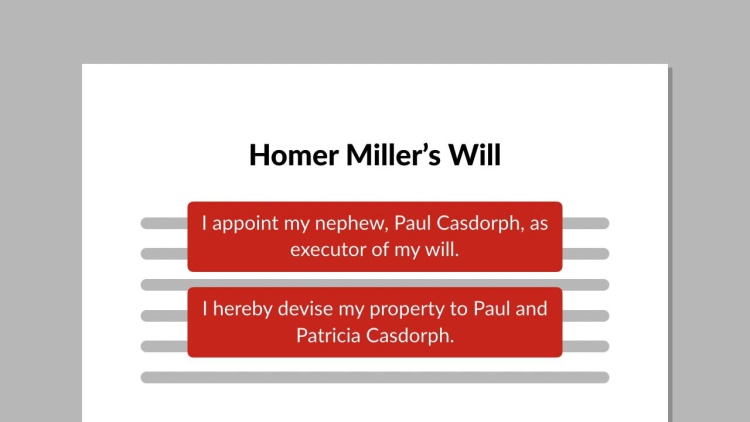Stevens v. Casdorph
Supreme Court of Appeals of West Virginia
203 W. Va. 450, 508 S.E.2d 610 (1998)

- Written by Christine Raino, JD
Facts
Homer Haskell Miller, who was elderly and confined to a wheelchair, executed his will at Shawnee Bank where two tellers, Judith Waldron and Reba McGinn, signed as witnesses to his will. Upon arriving at the bank, he asked the bank’s public notary to witness his signature. After he signed, the notary brought his will to the teller booths in the lobby where Waldron and McGinn, who had not seen Miller sign his will, signed separately from one another and separately from Miller since he did not go with the notary to the tellers’ work areas. Miller’s will left most of his estate to his nephew’s family, the Casdorphs (proponents), and upon Miller’s death, his nieces, the Stevenses (opponents), challenged the will as improperly executed. Both parties filed motions for summary judgment and the lower court granted the Casdorph’s motion for summary judgment, holding that the will was executed properly because the witnesses signed in Miller’s presence. The Stevenses appealed to the West Virginia Supreme Court of Appeals.
Rule of Law
Issue
Holding and Reasoning (Per curiam)
Dissent (Workman, J.)
What to do next…
Here's why 907,000 law students have relied on our case briefs:
- Written by law professors and practitioners, not other law students. 47,100 briefs, keyed to 996 casebooks. Top-notch customer support.
- The right amount of information, includes the facts, issues, rule of law, holding and reasoning, and any concurrences and dissents.
- Access in your classes, works on your mobile and tablet. Massive library of related video lessons and high quality multiple-choice questions.
- Easy to use, uniform format for every case brief. Written in plain English, not in legalese. Our briefs summarize and simplify; they don’t just repeat the court’s language.





